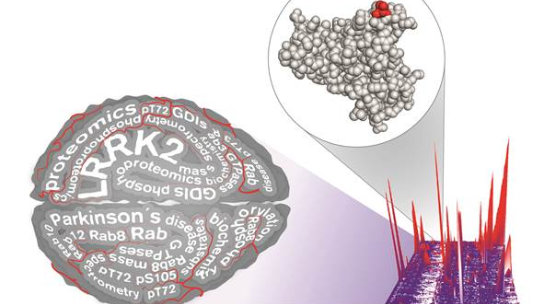Identifying Another Piece in the Parkinson's Disease Pathology Puzzle
Published On Thu 28 Jan 2016 by Roddy Isles

- International Consortium Identifies and Validates Cellular Role of Priority Parkinson’s Disease Drug Target, LRRK2 Kinase
An international public-private consortium of researchers brought together by the University of Dundee and led by The Michael J. Fox Foundation for Parkinson’s Research has identified and validated for the first time the cellular role of a primary Parkinson’s disease drug target.
In work published in eLife, the team comprising investigators from the University of Dundee, Max Planck Institute of Biochemistry, GlaxoSmithKline and MSD, known as Merck & Co., Inc., in the United States and Canada, has discovered that the LRRK2 kinase regulates cellular trafficking by deactivating Rab proteins.
This finding illuminates a novel route for therapeutic development and may accelerate testing of LRRK2 inhibitors as a disease-modifying therapy for Parkinson’s, the second most common neurodegenerative disease.
The team contributed unique tools and expertise toward rigorous systematic testing that determined the LRRK2 kinase regulates cellular trafficking by deactivating certain Rab proteins (3, 8, 10 and 12). Mutations in the LRRK2 gene are the greatest known genetic contributor to Parkinson’s disease.
Pharmaceutical companies are developing LRRK2 kinase inhibitors to correct the effects of those mutations and treat Parkinson’s disease. This new breakthrough finding that links mutant LRRK2 to inappropriate deactivation of Rab function unlocks more than 20 years of accumulated knowledge of the roles of Rab proteins. This knowledge can now be integrated to significantly improve our understanding of LRRK2 dysfunction in the Parkinson’s disease process.
Professor Dario Alessi, Director of the Medical Research Council Protein Phosphorylation and Ubiquitylation Unit at the University of Dundee, said the findings represented a major breakthrough in understanding the role of LRRK2 in causing Parkinson’s disease.
“The unique model of collaboration in this project and our systematic approach across laboratories using advanced technologies and layers of confirmation provide a firm foundation from which to continue this line of investigation and further refine our understanding of the LRRK2 Rab relationship.”
“The pathological cascade leading to brain diseases such as Parkinson’s likely includes many cellular players,” said Matthias Mann, PhD, Director of the Department of Proteomics and Signal Transduction at the Max Planck Institute of Biochemistry. “The identification of this LRRK2 substrate gives us a central piece in this puzzle and another potential place to intervene in the disease process.”
Marco Baptista, PhD, MJFF Senior Associate Director of Research Programs, said, “Identification of Rab proteins as a LRRK2 substrate presents a tool to measure the impact of these inhibitors not only on LRRK2 levels but also on LRRK2 function. This critical component will advance development of these therapies to slow or stop Parkinson’s disease, patients’ greatest unmet need.”
This MJFF-led consortium used a combination of tools in the discovery, including a knock-in mouse model of the most common LRRK2 mutation strongly associated with Parkinson’s (created by GSK), a second knock-in LRRK2 mouse model generated by MJFF, LRRK2 kinase inhibitors from GSK and Merck, and state-of-the-art mass spectrometry. These tools — and the collaborative spirit that united the partners — were necessary to make this finding.
With additional MJFF funding, this research group now is working to further characterize the Rab proteins modified by LRRK2 and to understand how an imbalance in cellular trafficking leads to the degeneration of neurons seen in Parkinson’s disease.
Notes to Editors
About the University of Dundee
The University of Dundee is the top ranked University in the UK for biological sciences, according to the 2014 Research Excellence Framework. Dundee is internationally recognised for the quality of its teaching and research and has a core mission to transform lives across society. More than 17,000 students are enrolled at Dundee, helping make the city Scotland’s most student-friendly. The University is the central hub for a multi-million pound biotechnology sector in the east of Scotland, which now accounts for 16% of the local economy. www.dundee.ac.uk
About the Max Planck Institute of Biochemistry
The Max Planck Institute of Biochemistry (MPIB) belongs to the Max Planck Society, an independent, non-profit research organization dedicated to top level basic research. As one of the largest Institutes of the Max Planck Society, 850 employees from 45 nations work here in the field of life sciences. In currently eight departments and about 25 research groups, the scientists contribute to the newest findings in the areas of biochemistry, cell biology, structural biology, biophysics and molecular science. The MPIB in Munich-Martinsried is part of the local life-science-campus where two Max Planck Institutes, a Helmholtz Center, the Gene-Center, several bio-medical faculties of two Munich universities and several biotech-companies are located in close proximity. www.biochem.mpg.de
About The Michael J. Fox Foundation for Parkinson’s Research
As the world’s largest non-profit funder of Parkinson’s research, The Michael J. Fox Foundation is dedicated to accelerating a cure for Parkinson’s disease and improved therapies for those living with the condition today. The Foundation pursues its goals through an aggressively funded, highly targeted research program coupled with active global engagement of scientists, Parkinson’s patients, business leaders, clinical trial participants, donors and volunteers. In addition to funding more than $525 million in research to date, the Foundation has fundamentally altered the trajectory of progress toward a cure. Operating at the hub of worldwide Parkinson’s research, the Foundation forges groundbreaking collaborations with industry leaders, academic scientists and government research funders; increases the flow of participants into Parkinson’s disease clinical trials with its online tool, Fox Trial Finder; promotes Parkinson’s awareness through high-profile advocacy, events and outreach; and coordinates the grassroots involvement of thousands of Team Fox members around the world. For more information, visit us on the Web, Facebook, Twitter, and LinkedIn.
For media enquiries contact:
Roddy Isles
Head of Corporate Communications
University of Dundee
Nethergate, Dundee, DD1 4HN
Tel: +44 (0)1382 384910
Mobile: 07800 581902
Email: r.isles@dundee.ac.uk